Enfeebled and enraged, Haredi society feels forsaken on all sides
The focus of growing anger, and increasingly frustrated in turn at the government’s lax enforcement of virus rules, the ultra-Orthodox are now a political time bomb
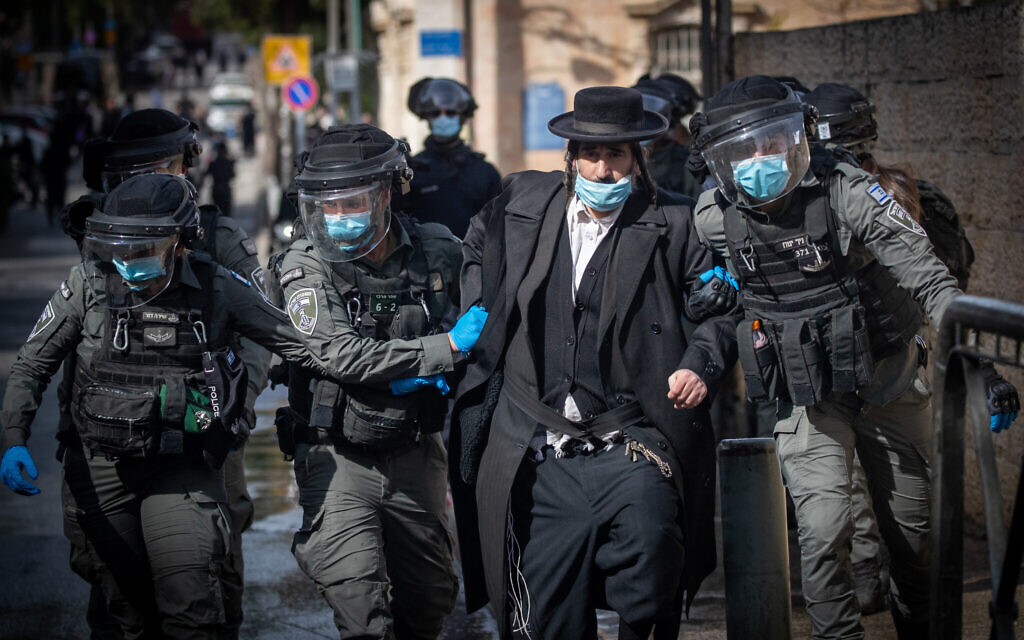
Monday afternoon in the Knesset. MK Moshe Gafni of United Torah Judaism heads to the dais to speak about a bill advancing through parliament that will allow police to slap steep fines on schools that violate virus restrictions and even to close them by force.
He’s visibly angry; his comments are short and to the point.
“You’re only bringing this bill to vilify the Haredi public!” he declares.
Then he adds, in comments that would later go viral on Israeli social media, “It’s not our fault! You, who sent us to live in such crowded conditions, it’s your fault!”
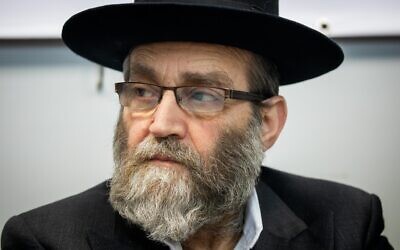
It was an astonishing display that encapsulated the confused, anxious Haredi non-response to the crisis of rule-breaking that’s setting parts of the community aflame, and the frantic search for someone to blame.
Ultra-Orthodox violations of the virus restrictions aren’t new. The problem has simmered for months, occasionally waning as contagion rates and corresponding restrictions recede, then exploding again onto the public agenda when the pandemic returns with a fury.
But the latest round of anger and anxiety surrounding Haredi struggles with the virus has quickly reached a fever pitch. Recent days have seen violent riots in Haredi population centers as police moved in to enforce long-ignored health closures.
In the usually placid city of Bnei Brak, a municipal bus was torched to its metal skeleton after young Haredi men dragged the driver from the vehicle. Camera crews, including a Fox News team, were either attacked or had their vehicles vandalized in Haredi areas. Israeli news broadcasts have carried photogenic vignettes of such violence for days.
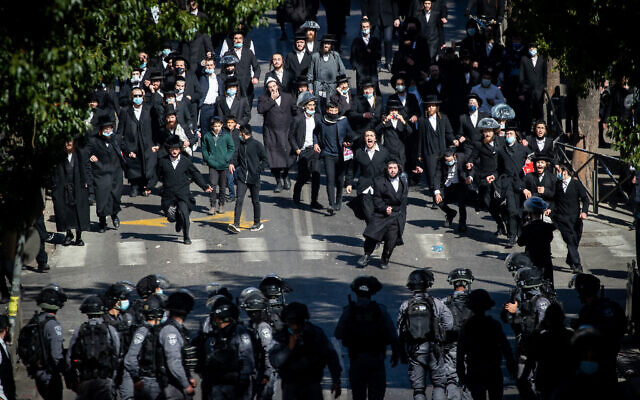
And throughout the rising violence, Haredi rabbinic and political leadership were nowhere to be found.
Voter fury
The anger and frustration have now engulfed the debate. Channel 12, sensing the public mood, decided to ask in a poll released Tuesday whether Israelis wanted Haredi political parties to be part of the next governing coalition.
Among the self-identified center-left, 78 percent prefer the next government not include the Haredi parties; just 5% want them included. That’s an extraordinary gap, but not really unexpected. The center-left is largely drawn from Israel’s secular bastions, the large cities, kibbutzim, and the like.
The surprising figure came from the other side, from the self-identified right. A majority, 52%, said they, too, didn’t want the Haredi parties in the next government. Just a third, 33%, said they wanted them.
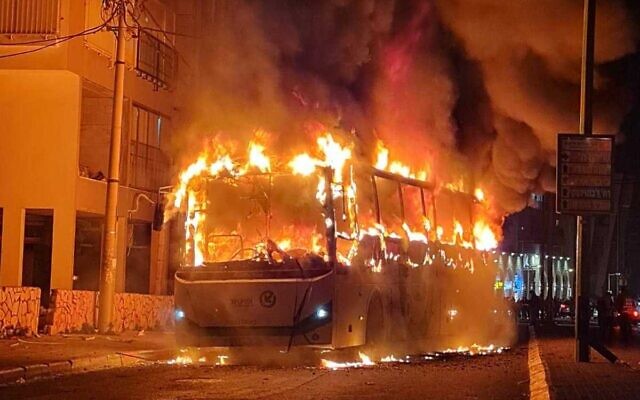
As Channel 12 explained, that’s “an extraordinary shift,” underlining the current of anger at the ultra-Orthodox for refusing to adhere to virus restrictions and the latest iteration of longstanding bitterness toward a society and a leadership that is seen by many Israelis as having carved out an autonomous existence separate from the broader Israeli society.
Anyone following the social media responses to Gafni’s comments, which ranged from sarcastic to vicious, saw that animus borne out.
“Sure, of course. I sent the Haredim to live in crowded apartments. Not their birthrate,” one commenter sneered, earning hundreds of likes.
“Really sorry. Sorry we went to school, served in the army, worked, paid taxes, and never understood that leeches like you…” – there’s no need to translate the entire comment. The gist is clear. The sentiment was commonplace on Hebrew-language social media in the wake of the speech.
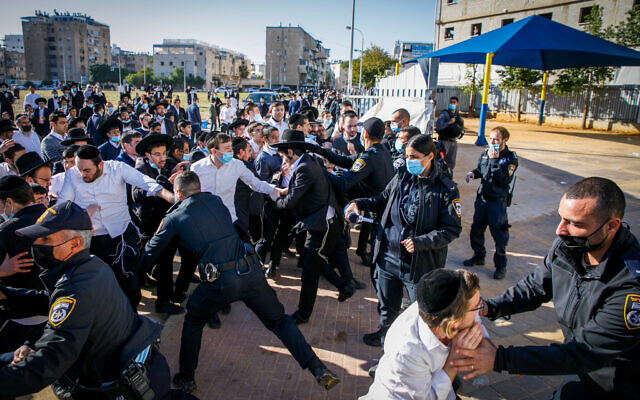
Teeming and desperate
Gafni’s Knesset speech came during a debate on a bill that sought to double fines for schools that defy lockdown closures. The refusal to shutter their schools has been viewed as an expression of the foundational role Jewish education has in Haredi life, so why mention crowding?
No one “sent” the Haredim to live where they do, as Gafni claimed. No law requires that double-digit percentages of Haredi men refuse to join the workforce and commit themselves instead to full-time religious study. No one demands that Haredi couples have 12 children, even as they plan to have only one parent working.
But Gafni’s concern about crowded conditions is nonetheless a real and all-pervasive Haredi experience. Haredim have among the highest birthrates in Israel. In some Haredi towns, families with 10 or 12 children are the norm. Apartments, however, are no bigger than in other towns and cities.
Those crowded conditions are central enough to Haredi life that they shape the most basic social institutions of many ultra-Orthodox.
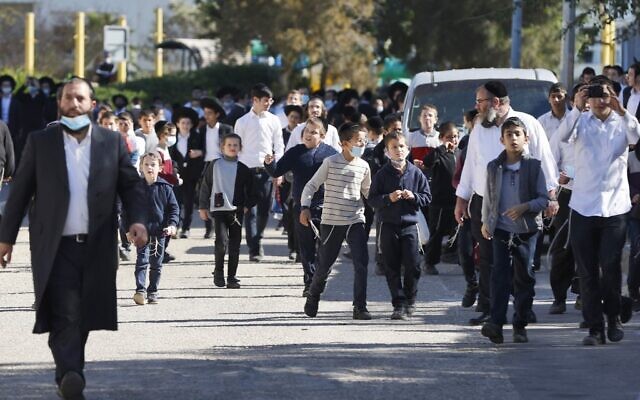
Haredi society is in an important sense built on the principle that a great deal of childcare is outsourced to the community. Nowhere, or at least nowhere in Israel, is the old adage that it takes a village to raise a child more true than in the Haredi community. Children spend most of their waking hours in communal and educational frameworks outside the home, many of them only returning home at 6 p.m. or even later.
A Haredi news site reported in frustration that the bus set alight by rioters burned for an hour, melting the window shades of a nearby apartment building, while no cop or firefighter bothered to show up
A 12-child family sees its small 75-square-meter (807-square-foot) apartment not as a living space meant to be used during the day, but as little more than a glorified bedroom for people who must spend their waking hours somewhere else.
Lockdowns thus affect Haredim more powerfully. It’s hard to compare the struggles of the average five-person secular family through the crisis with those of a 12-person family, especially one that also shuns smartphones, television and the internet. Home isolation under such conditions is well-nigh unbearable. The repeated lockdowns, and especially the school closures, have hit Haredi society especially hard.
In many places, parents and school officials conspire to open their schools, furtively and with the full knowledge of the dangers involved, out of simple, raw desperation.
It is in such places that news film crews have taken footage of elementary schools where students were told to rush out the back gate if police arrive.
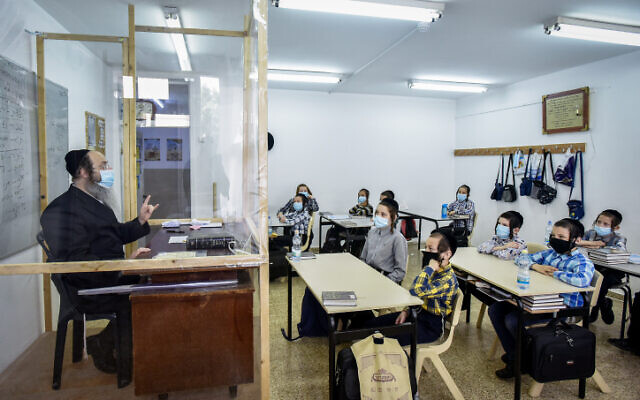
It is that rule-breaking that drove lawmakers to consider the bill that so angered Gafni, which would increase fines to as much as NIS 10,000 ($3,000) for an institution that defies the lockdown, and would grant police the power to close the institution by force.
And it was in the middle of a debate on that bill that Gafni went before the cameras and shouted at non-Haredi Israel that it was their fault – “you who sent us to live in such crowded conditions” – that Haredim struggle to obey the virus rules.
A community forsaken
The ultra-Orthodox know they are suffering from the virus far more than non-Haredi Israelis. Their elderly are dying at three times the rate of secular Israelis.
Prominent Haredi journalists and public figures have railed against the rule-breaking among many in their community.
In one video spread far and wide on Haredi social media, eventually making its way to the mainstream nightly news broadcasts, a Haredi man is heard attempting to report a school that had opened in violation of the lockdown rules, but is told by police that enforcement in Haredi areas is subject to “political” limitations.
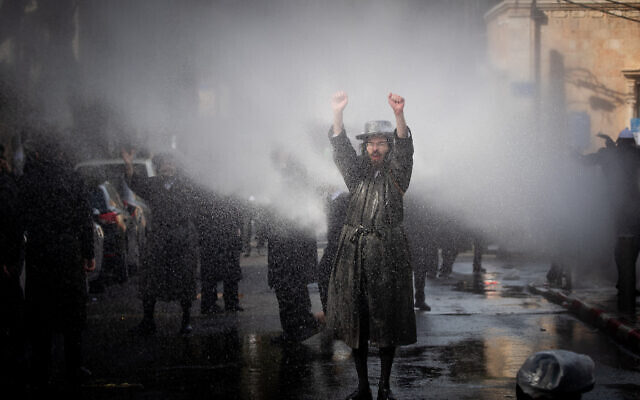
A Haredi news site reported in frustration that the bus set alight by rioters on Monday burned for an hour, melting the window shades of a nearby apartment building, while no cop or firefighter bothered to show up. Such incidents, and countless others like it, served to underline the frustrations of those who feel authorities have unfairly consigned the community to its fate.
They have contributed, too, to the feeling among many Haredim that their community has been turned into a convenient scapegoat for the broader society’s frustrations with the pandemic, even as it was abandoned by the state and by authorities who refuse to take their needs into account.
The anger at the Haredim is real and growing. The anger felt by the Haredim at the government and their own political leaders is just as real, and growing just as quickly.
In a January 6 interview with Israel Radio, Deputy Transportation Minister Uri Maklev, a lawmaker from Gafni’s UTJ party, warned of “bitterness toward Netanyahu” among his voters — and toward him and his fellow Haredi lawmakers.
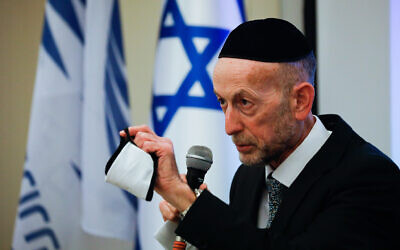
“There wasn’t consideration given to the needs of the Haredi public” – forcing large families to isolate in small apartments, for example – “and there’s a sense of detachment from the Haredi public’s demands,” he accused.
Haredim “were humiliated and vilified, and the voter is saying [to us], ‘You should have stood up for us a lot more powerfully.’ I’m not blameless here, I think it’s important to take the criticism,” Maklev said.
That criticism isn’t hard to find. Polls over the past month have shown a slow but steady decline in support for the Haredi parties, Shas and UTJ, among Haredi voters, which drew a consistent 16 seats between them a month ago but are more likely to get 12 and 13 over the past week.
Haredi anger has grown potent enough to threaten the Haredi alliance with Likud.
On Monday, as the Likud-backed law fining rule-breaking schools advanced, UTJ’s Gafni was overheard in the Knesset telling one Netanyahu adviser, “What are we, your slaves? We’re having serious second thoughts about this partnership” — the one between the Haredi parties and Netanyahu.
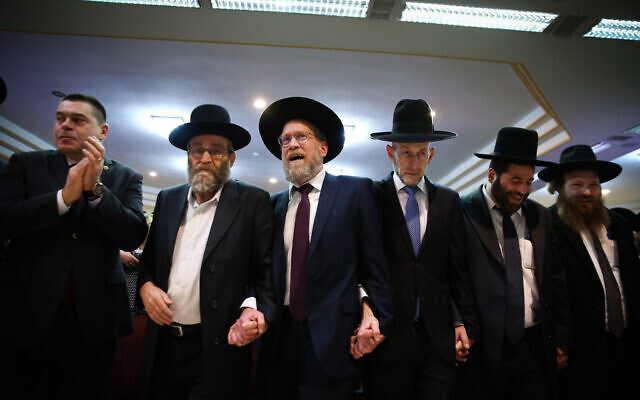
Even the Haredi world’s rabbis haven’t emerged untarnished from the past 10 months.
The Vizhnitzer Rebbe, Rabbi Israel Hager, one of the most influential Hasidic leaders in the country, is prominent enough and his Hasidic sect large enough to have a reserved slot on the United Torah Judaism party’s Knesset slate. Since 2019, that slot has been filled by Hager’s appointee MK Yaakov Tesler.
Last week, to the astonishment of the country, Hager issued an order to his Vizhnitz movement’s schools to reopen their gates despite the government-ordered lockdown.
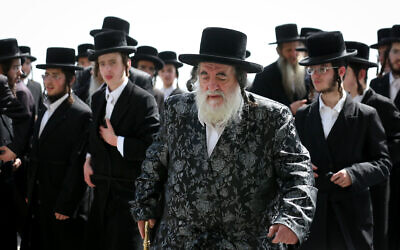
It took scarcely a day for the rabbi’s advisers to issue a “clarification” explaining that the rabbi did not actually mean schools should open, but was merely expressing the pain he felt over the cessation of learning.
It was a strange episode. The news reports of Hager’s order angered countless Israelis. The clarification didn’t seem to explain the explicit instructions of the original order.
Hager isn’t alone. A similar episode several months ago saw Rabbi Chaim Kanievsky, widely acknowledged as the preeminent living Ashkenazi Haredi sage, issue similar instructions against shuttering learning institutions despite the lockdown in force at the time — only to have the purported orders reversed by his advisers after a public outcry.
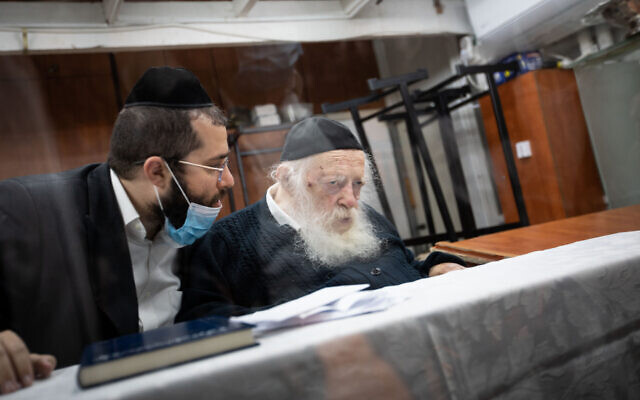
The Haredi community, long accustomed to the leadership of rabbis believed to be divinely inspired, suddenly finds itself rudderless in the throes of its most desperate crisis in generations.
Indeed, more and more Haredim are beginning to wonder if the rabbis aren’t part of the problem. As one Haredi media personality put it bitterly on Twitter, after calling for “freezing budgets for institutions” that break the rules, “nothing will change as long as respect for the rabbis and the Hasidic masters remains intact.”
The street will not forget
The Haredi parties have been key anchors of Prime Minister Benjamin Netanyahu’s coalitions since 2015. It’s no longer clear that many of Netanyahu’s non-Haredi supporters want that to remain the case. It’s no longer even clear that many traditionally pro-Netanyahu Haredi voters want that to remain the case.
Likud doesn’t want to increase police enforcement in the Haredi community now, 55 days out from an election in which Netanyahu has no hope of retaining power without the full-throated support of the Haredi public.
Yet the bill to increase fines against violators, set to advance in a Wednesday plenum vote, isn’t being pushed by the secularists or the left, but by Likud. Netanyahu has caught wind of the public mood. He can’t afford to lose voters angry at his lax enforcement of Haredi rule-breaking either.
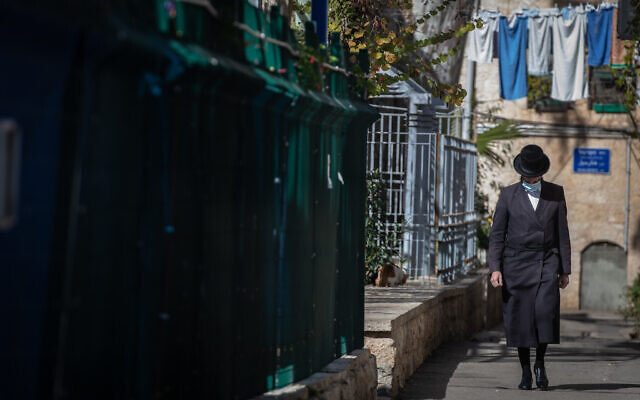
The recent violations, the violence in the streets, the sense that Haredi communities are betraying the basic solidarity expected of them by the rest of Israeli society – all these images and emotions have crystallized into widespread anti-Haredi anger, an anger Netanyahu must now grapple with as it seeps deep into the political right.
The pandemic may soon come to an end as the vaccination drive catches up to the contagion. But the social crisis the pandemic has sparked among the Haredim, the discovery that neither their religious leadership nor their political parties really know how to lead them through a crisis, that neither the Israel Police nor the government they have backed time and again is willing to battle their anarchic segments and bring order to their streets — that painful realization will remain long after the virus fades away.